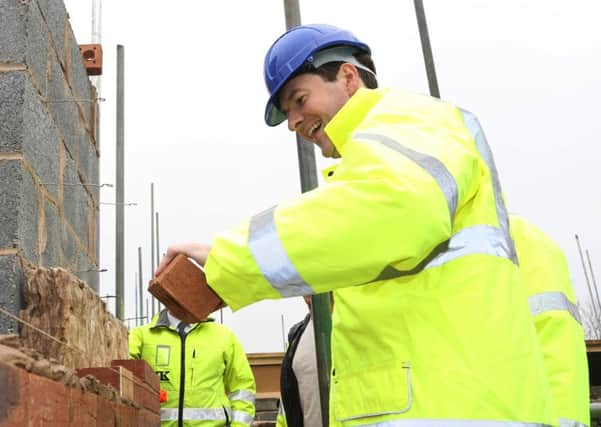If you want power, you will have elected mayors, says Chancellor


The Chancellor last week used his Summer Budget to confirm new decision-making rights for Greater Manchester, which has agreed to the introduction of a Boris Johnson-style mayor.
Speaking, on a visit to Leeds today, Mr Osborne left little doubt that he expects West Yorkshire and South Yorkshire to follow suit if they are to reap the full reward of his flagship Northern Powerhouse economic project.
Advertisement
Hide AdAdvertisement
Hide AdBut hours later, his plans suffered a setback after peers backed an amendment preventing ministers from making it a condition that large powers are only devolved to a city or group of authorities led by a directly elected mayor.
The House of Lords voted by 240 to 175, majority 65, as Labour and Liberal Democrat peers combined to inflict a third defeat of the day on the Cities and Local Government Devolution Bill.
Tory former deputy prime minister Lord Heseltine, whose 2012 report provided the basis of the Government’s policy, described the move as a “wrecking amendment”.
Mr Osborne said during his visit to Leeds today: “The deal on the table is that we can have a really strong set of devolved powers here in West Yorkshire and indeed separately potentially with Sheffield and in South Yorkshire but there has to be some accountability for local people.
Advertisement
Hide AdAdvertisement
Hide Ad“If you are going to hand over control of transport and health budgets and things like skills and learning you have got to make sure there is someone who is accountable to local people and elected by local people and who can be held responsible if things don’t go well and that means an elected mayor.
“That’s what Greater Manchester has agreed and we are very far now into talks with both the authorities in West Yorkshire and the authorities in South Yorkshire to see if we can take this step forward.
“I think it’s really important because part of building a Northern Powerhouse and building up the north of England means giving more power and control to local people over the things that happen here and that’s best directed through a mayor like you have a mayor for London.”
Additional powers handed to Greater Manchester last week included placing the area’s fire service in the charge of the mayor as well as the creation of a commission that will have a say over public sector land.
Advertisement
Hide AdAdvertisement
Hide AdDuring his visit to a new housing development in Morley, Mr Osborne was also asked if he was embarrassed by the recent decision to put the much-trumpeted electrification of the main Leeds-Manchester rail route on hold.
He said: “I am as frustrated as anyone about the problems with the electrification of the transpennine line.
“We will still see some major improvements on that line going ahead and the services are going to improve and we’re going to get rid of the old trains but we have also got to get the line electrified for the future and we are making sure we see what has gone wrong with the organisation, Network Rail, that was supposed to have delivered this and we are making sure there is new management there and I am absolutely personally involved in making sure we get this project back on track.
“People will still see some big improvements over the next couple of years but I want to see the full suite of improvements because the key to the Northern Powerhouse is not just investing in things like science and jobs here, not just building homes here, not just having elected mayors here, it’s making sure that all of these great cities in the North are better connected and the route across the Pennines is really important to that.”
Advertisement
Hide AdAdvertisement
Hide AdMr Osborne visited Leeds following the publication last Friday of his Fixing The Foundations report, which set out a wide range of measures to improve nationwide productivity by relaxing planning laws, streamlining skills training and investing in infrastructure.
Proposals include automatic permission for developers to build on brownfield sites, stronger compulsory purchase powers to seize derelict land for housing and a fast-track procedure that is designed to speed up the progress that can be made on major infrastructure projects.